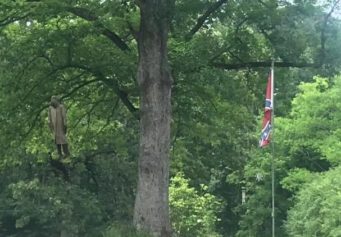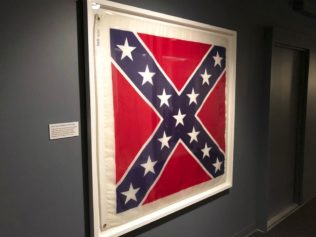A racially divided war memorial in South Carolina dedicated to fallen World War I and II soldiers has forced South Carolina state legislators to square off in a fight the South has been having for years: At what point does an attempt to celebrate racial integration become an attempt to rewrite history?
The war memorial has two distinctive categories for the names engraved on the plaque—“white” and “colored.”
It’s a division that comes from the racially segregated history surrounding when the plaque was made.
Despite the historical context, Greenwood’s white Democratic-leaning mayor, Welborn Adams, wants the memorial replaced with another version that will integrate all the names in order to promote equality.
The mayor moved forward with ordering new plaques that are ready to be put up whenever he gets the green light—but that’s where the problem arises.
When the mayor attempted to put up the new plaques, he was met with backlash from other officials who argued that the state law forbade him from replacing the historical memorial.
The law they are referring to states that historical monuments cannot be altered in any way without the necessary approval from two-thirds of the state lawmakers.
So what exactly is preventing him from getting the approval he needs?
Other lawmakers are siding with historians who say altering the piece would ruin the historical context.
“Segregation was the accepted social order of that time,” said Eric Williams, who spent more than three decades as a historian in the U.S. Park Service. “If we alter the monument, we alter its historical integrity.”
Adams said that after reaching out to other mayors, nobody else seemed to have any knowledge of other such racially divided memorials in the state.
Adams was surprised by the pushback. He was so sure that the new plaques would be green-lighted that he already took out a loan to pay for them. A total of 43 additional donors also helped pay for the project, and the mayor donated $1,000 of his very own.
He planned on unveiling the new memorial on Martin Luther King Jr. Day.
According to one activist, Joseph McGill, the mayor’s heart is in the right place but attempting to rewrite history isn’t the way to promote equality.
McGill, who spends the night in old slave cabins to bring attention to the need to preserve them, said that integrating the names on the plaques would “just spread the perception that segregation did not exist or wasn’t that bad,” Fox News reported.
Many people are siding with McGill.
“I think it is important to acknowledge the specific context in how African-American soldiers had to serve in the military,” Chad Williams of Brandeis University in Boston added, according to Fox News.
While the mayor argued that he is in no way trying to rewrite history, opponents of the new plaques have managed to use his own words against him.
“I think if history offends people it needs to be rewritten if possible,” Adams said back in December to The Index-Journal of Greenwood.
He has since backtracked on that statement and admitted he spoke without thinking, but those words are still being used to prevent him from touching the historical plaques.
He has since filed a bill to change the Greenwood memorial, and while state legislators have agreed to give the bill a fair look, they also made it clear that they don’t want to revisit an age-old argument.
“I’ll look at the bill,” said state Sen. John Courson, a Republican from Columbia who has been in the Senate since 1985. “But I don’t want to reopen the whole debate. That was last century’s battle.”
The old battle he was referring to was a debate over Confederate memorials that took place roughly 15 years ago. Courson helped craft a bill at the time that promised to protect memorials, street names, park names and other historical landmarks that honored Confederate generals after the Confederate flag had already been removed from the Statehouse dome.
It’s the protection of such racially charged memorials that drove Adams to wonder if some opponents of the new plaques were merely using history as a cover-up for what were truly racist intentions.
“I wonder if some of the opposition is racism hiding behind history,” he said.
Either way, he is pushing forward with his fight to create an integration-celebrating memorial in a city with a roughly 45 percent Black population.
“I am fully aware this is much tougher than I ever expected,” he added. “But it’s the right thing to do.”
If Adams is allowed to replace the old plaques, he plans on putting them on display at the county museum.


